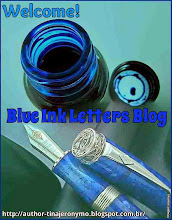Created with flickr slideshow.
Sou Tradutora (inglês/português) profissional, formada em Letras-Tradução pela Universidade Anhembi-Morumbi, atuando há mais de 20 anos no campo técnico e especialmente literário. Traduzi mais de 190 livros até o presente, entre romances, livros de negócios, de autoajuda, biografias, guias, trabalhando como freelancer para editoras renomadas. Também escrevo artigos, crônicas, textos em geral, e acabo de publicar o “Meu Próprio Livro”. I'm a professional Translator (English/Portuguese), with a Letters/Translation degree. I've been working for more than 20 years in the area, with technical and especially literary translation. I’ve translated more than 190 books up to now, among novels, business books, biographies, self-help books, guides, working as a freelancer for renowned publishers. I also write articles, chronicles, general texts, and I’ve just published my own book, called “Meu Próprio Livro”.
terça-feira, 25 de fevereiro de 2014
Nova Era
New Era
sábado, 22 de fevereiro de 2014
The Benefits of the Sense of Humor
 |
| Dedicated to the Brilliant Master |
LINKS:16 Páginas Adicionais do Blog AE/ to 16 Additional Pages:
- SOBRE O BLOG - ABOUT THE BLOG
- 1 - Início (Página Principal-Artigos - Main Page-Articles)
- 2 - Dicas de Escrita / Writing Tips
- 3 - Minhas Traduções / My Recent Translations
- 4 - Dicas de Tradução/ Translation Tips
- 5 - Citações Diversas/Thinkers' Quotes/Pensamientos
- 6- Harmonia Espiritual/ Spiritual Harmony / Espiritualidad
- 7 - Cartões Cômicos/Comic Cards
- 8 - Livros que Curto/ Books I Enjoy
- 9 - Fotos / Pictures - by TJ
- 10 - Meu Cantinho do Queen _ My Queen Band Corner
- 11 - Meu Próprio Livro
- 12 - Meus Cartoons/Composites/Collages
- 13 - Cantinho do Visitante e Seguidor/ Visitor's Corner
- 14 - Lista dos Livros Que Traduzi/ List of My Translations
- 15 - Cozinhando com TJ
- 16 - Cooking with TJ
Traduzir / Translate:
Seguidores/Followers
Pesquisar/Search:
Visualizações - Views:
.

Mais Vistas - Página Principal - Most Visited on Main Page:


5º Aniversário do Blog - Abril/2016

BLOG'S 5th ANNIVERSARY- APRIL,2016
.

- Aqui o Blog Aprendizes de Escritores é bilíngue e tem 15 páginas. - Here Aprendizes de Escritores (Writers’ Apprentices Blog) is a bilingual blog with 15 pages. - Há também uma versão menor do blog, com uma só página, em inglês, que se chama Writers’ Apprentices. - There’s also a smaller version of the blog, with only one page, just in English, called Writers’ Apprentices. WA-LINK: no notebook abaixo. -in the notebook below:
.

.

.

.

.

.

.

.

Os textos deste blog são de autoria de Tina Jeronymo. Exceto por fotos pessoais, as imagens são de domínio público da internet. / Texts attribution on this blog: Tina Jeronymo. Except for personal pictures, the images are of internet public domain.




.jpg)





.jpg)
.jpg)

.jpg)
.jpg)
















